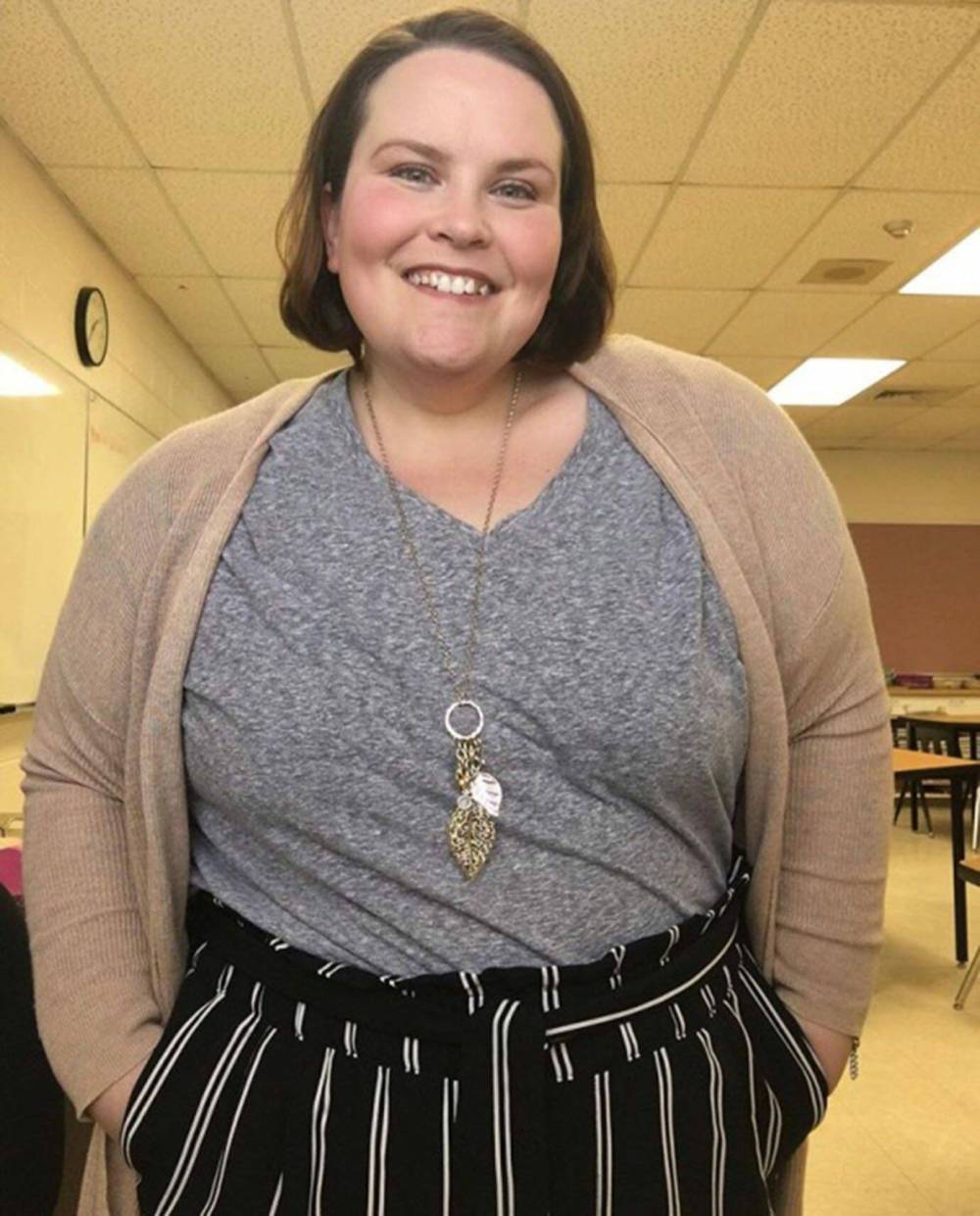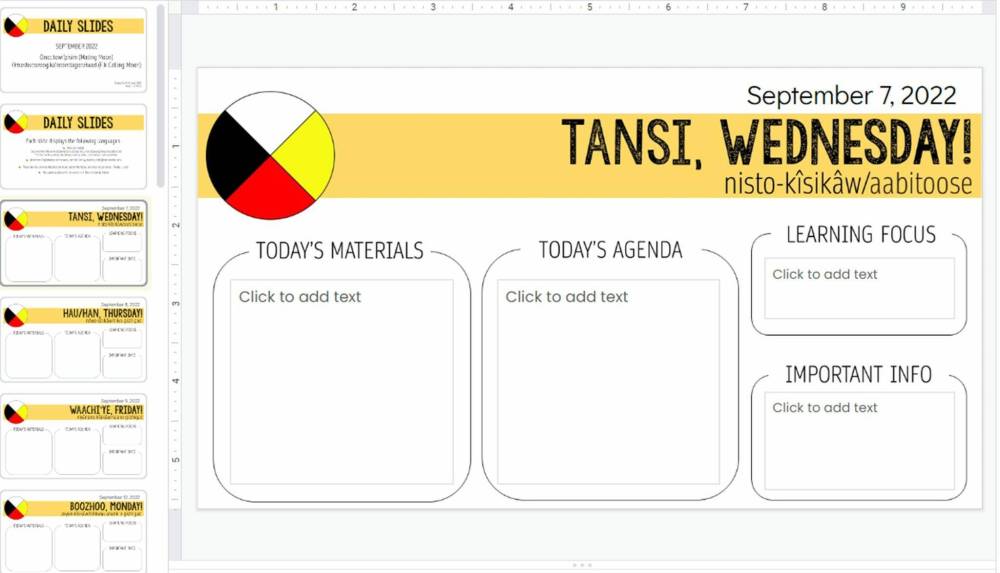Saying ‘Tansi’ to new school year
Teacher hopes Indigenous-language virtual agenda will be widely adopted
Advertisement
Read this article for free:
or
Already have an account? Log in here »
To continue reading, please subscribe:
Monthly Digital Subscription
$0 for the first 4 weeks*
- Enjoy unlimited reading on winnipegfreepress.com
- Read the E-Edition, our digital replica newspaper
- Access News Break, our award-winning app
- Play interactive puzzles
*No charge for 4 weeks then price increases to the regular rate of $19.00 plus GST every four weeks. Offer available to new and qualified returning subscribers only. Cancel any time.
Monthly Digital Subscription
$4.75/week*
- Enjoy unlimited reading on winnipegfreepress.com
- Read the E-Edition, our digital replica newspaper
- Access News Break, our award-winning app
- Play interactive puzzles
*Billed as $19 plus GST every four weeks. Cancel any time.
To continue reading, please subscribe:
Add Free Press access to your Brandon Sun subscription for only an additional
$1 for the first 4 weeks*
*Your next subscription payment will increase by $1.00 and you will be charged $16.99 plus GST for four weeks. After four weeks, your payment will increase to $23.99 plus GST every four weeks.
Read unlimited articles for free today:
or
Already have an account? Log in here »
Hey there, time traveller!
This article was published 01/08/2022 (1223 days ago), so information in it may no longer be current.
A Winnipeg teacher wants her colleagues to welcome their students in Indigenous languages on the first day of school — and the following 185 days in the 2022-23 calendar.
Michelle Arnaud has been assigning herself homework throughout her summer because, as far as she is concerned, “decolonizing education” is unending work that does not stop when the final bell rings in June.
The high school educator’s latest project is a virtual agenda that features beginner terms in Cree, Michif, Anishinaabe, Dakota and Oji-Cree.
When incoming ninth graders enter her classroom on Sept. 7, they will be greeted by a projected slide bearing the words: tansi (“hello, how are you?” in Cree), nisto kîsikâw (“it is Wednesday” in Cree) and aabitoose (“halfway” in Ojibwa).
“My big thing is not only incorporating (traditional) knowledge into my lessons and the curriculum, but it’s putting the language back into the classroom that took it away from my great-grandmother,” said Arnaud, who is Métis and has Cree, Anishinaabe and European ancestry.
Arnaud’s great-grandmother on her mother’s side was forced to attend residential school, where she and her peers were brainwashed into being ashamed of their culture and penalized for speaking Cree.
As a result, Arnaud knew she was Indigenous when she was growing up, but she said she knew little about what that actually meant. The classroom teacher said she now proudly introduces herself with her spirit name — Waabishkizii Migizi Ikwe, which means White Eagle Woman in Ojibwa and marks her membership in the Thunderbird Clan.
“As a reconnecting Indigenous person at 40, who is learning how-to speak Cree and learning about the medicines and different knowledge that I can place into the curriculum, I just feel that this is the path that my ancestors have put me on,” said the Grade 9 teacher.
Over the last four years, Arnaud has been intentional about deconstructing her science, math and social studies lessons to ensure western and Indigenous knowledge can coexist in her classroom.
She recently came across the work of Greek philosopher Empdecles, best known for his belief that all matter is composed of fire, air, water and earth — not unlike the four elements that fit within the medicine wheel. It was then Arnaud said she realized that Indigenous knowledge could easily fit within all of the Grade 9 science units, ranging from atoms to the universe.

While math has been a bit more challenging, she said has started teaching students how to do basic counting in Cree and build teepees, part of a lesson about shapes and surface area.
In the Winnipeg School Division, approximately 27 per cent of the student population self-identifies as First Nations, Métis or Inuit. Roughly nine per cent of the division’s permanent teachers are Indigenous.
Arnaud said she is passionate about introducing Indigenous content so her students are represented in teaching materials, as well as ensuring her non-Indigenous colleagues feel comfortable doing the same.
Using a daily calendar in which Indigenous languages are embedded is an easy first step, she said.
The initial template for September 2022 will be able to download the agenda through her social media and website, free of charge. Arnaud plans to record a pronunciation guide so educators know how-to properly enunciate all of the terms on her slides.
“The late (elder) Ted Fontaine said to me: ‘You have a knowledge within you that has been suppressed for hundreds of years, that you are going to start learning yourself. Share it as far as you can, because it’s not going to help the students that you teach, but it’s going to help the colleagues who are non-Indigenous help those kids,’” she said.
The educator called Fontaine’s advice “a lightbulb moment.”
In the long-term, she said her goals are to continue creating free education resources and rewriting the Grade 9 science curriculum with Indigenous teachings embedded to be presented to the education department.
Earlier this year, Manitoba revealed an Indigenous education policy framework entitled Mamàhtawisiwin: The Wonder We Are Born With. The 73-page document outlines the province’s belief that schools need to better incorporate Indigenous ways of knowing, being and doing to improve student success.
maggie.macintosh@freepress.mb.ca
Twitter: @macintoshmaggie

Maggie Macintosh reports on education for the Winnipeg Free Press. Funding for the Free Press education reporter comes from the Government of Canada through the Local Journalism Initiative.
Our newsroom depends on a growing audience of readers to power our journalism. If you are not a paid reader, please consider becoming a subscriber.
Our newsroom depends on its audience of readers to power our journalism. Thank you for your support.



